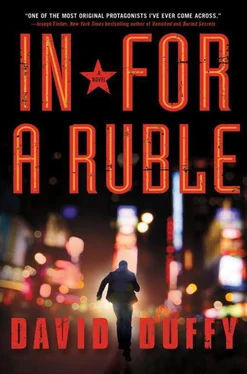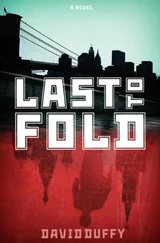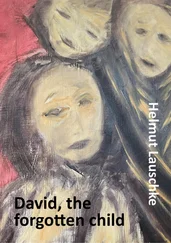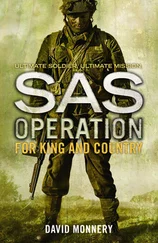“The aforementioned Oleg Konychev?”
“If you knew, what did you need me for?”
“Making sure what I’m getting myself into.”
“And?”
“I have a feeling I’ll meet up with Uncle Efim and his axman later tonight.”
“Be careful.”
“I plan to. But I’ve got another feeling that those two may be the least of my worries.”
I broke the connection and called Victoria. Voicemail. I did the right thing. I told her where I was and where I was headed and that I believed Konychev was headed there too. She’d send the cavalry—but in this weather they wouldn’t make it before I finished my business with Nosferatu.
The snow narrowed the Taconic to one lane, but the traffic thinned too. Impatient commuters turned off as they neared home. Eventually, a sparse parade of well-spaced cars marched north at a steady thirty miles per hour through Westchester, Putnam, and Dutchess counties. I kept two hands on the wheel, two eyes and half my attention on the road. The rest of me pondered how a seventeen-year-old girl could so successfully confound organized crime. I thought I understood why she’d want to, but not why she thought she could get away with it. Maybe she didn’t expect to.
A chicken’s hardly a bird, a woman’s hardly a person—one of our less appealing, but no less illuminating, sayings. It speaks more to the insecurity of Russian men than the tough-mindedness of our female counterparts. Still, I was unlikely to cite it to Victoria.
The women I knew in the camps were the strongest people there. They had to defend themselves, not only against the elements, the guards and the system—they had to keep other zeks at bay too. It wasn’t uncommon to wake up to a corpse on the sploshnye nary —communal sleeping boards—with a knife wound in the chest or neck, next to where the object of his unwanted attention had spent the night.
In later years, I discovered that in a nation whose history is replete with irony, the position of women was irony amplified. They had no rights under the czars, yet five became czars themselves, including Catherine. History awarded her the same sobriquet as Peter. The Bolsheviks made a big deal of neutralizing gender, but like so many other Communist constructions it was founded on quicksand. Not one woman served in the Politburo under Lenin or Stalin. Khrushchev appointed the first—as (surprise!) minister of culture. She bore the same name as the empress, and with our sense of irony, became known as the second Catherine the Great. After Stalin’s wife committed suicide, he had the wives of his Politburo cronies rounded up and shipped off to jail or the camps. Little wonder that wives of future leaders stayed deep in the background, rarely appearing in public with their sour-faced husbands. The first “first lady” to take a high profile was Raisa Gorbachev—with the predictable result of undermining public confidence in her husband and his reforms because people thought she was calling the shots.
As Russia moved from Party control through glastnost and perestroika to democratic chaos to pseudodemocracy run by the Cheka, women came out of the back room. Some flaunted their sex and control over the oligarchs who rivaled the Politburo bosses in coarseness but showered their newfound ornaments with gifts and wore them like prizes—often two, three, four at a time—on their arms. Tamara Konycheva’s predecessors.
Others excelled in sports and culture. Still others made their mark in business and professions such as journalism. Many of the crusaders who have been cut down for carrying the flame of truth close enough to scorch the powers that be were female. Still others, if Irina Lishina was any indication, had a talent for crime.
Given the history and the lawless, dog-eat-dog society in which she grew up, it wasn’t all that astonishing that Irina thought she could single-handedly one-up the BEC. Her father had helped start it, maybe died because of his role. She’d almost certainly witnessed his murder. Her uncle and stepfather were successful crooks. One of them likely killed her old man. One of them screwed teenaged girls. This was her world. Her actions began to appear totally consistent—an eye for an eye, a wound for a wound, a corpse for a corpse. She’d show she could dish out as much pain as she received.
She’d found a willing agent in Andras. I was betting she had others. I was hoping I wasn’t acting as one more. I couldn’t swear that I wasn’t.
A good time to watch my back—just like I told myself two weeks ago at Trastevere.
Nothing was stirring on Route 44, the main road through Millbrook, at 8:00 P.M. Snow kept falling. I stopped and put down the window a mile north of town. As dark and still as I remembered Siberia to be—no houses, no cars, no lights, no sound. No sky either, just falling snow.
Caldecott Lane was two miles farther on. It hadn’t been plowed, but I made it far enough in for the darkness to hide the Explorer from cars passing on the main road. My new boots sank six inches into fresh snow. Not for the first time, I bemoaned the fact that the sporting goods store hadn’t sold firearms. There are supposed to be more gun dealers in the United States than McDonald’s in the entire world, but Stamford was an empty room in the armory. I’d made do with a large hunting knife in a plastic scabbard and an aluminum baseball bat. The thought of either embedded in Nosferatu’s bucktoothed face wasn’t displeasing.
I climbed a fence and strapped on my new snowshoes. I tucked the hunting knife into the waistband at the small of my back. Standing atop the accumulation of two storms, the top of the fence barely reached my knees. I set off at a clip that surprised me in ease and speed, at a thirty degree angle from Route 44. No moon, no stars, no lights. Just more snow. Even in the middle of an open field, I was invisible.
I was fifty yards from Leitz’s place, climbing another fence, when the barn appeared. The drive in front had been plowed during this storm, but hours ago. It showed no tire tracks or footprints. I pressed on, veering north, around the back of the main house, until I reached the pool. I recognized it from the satellite map and the large rectangle of fence top peeking out of the snow. The guesthouse was on the other side, thirty yards away. Beyond that was the garage. The stately main house stood to my left, woods fifty yards to my right. My watch said 8:55.
I waited a good ten minutes, watching, listening. Not a sound. Not a sight. Not a light. I could have assumed wrong and Irina didn’t have Uncle Oleg’s muscle here after all. More likely, the man—men?—were good and well hidden by the garage.
I moved to the back door of the guesthouse and pressed myself to the building while I removed the snowshoes. The alarm panel showed green. I worked the key in the lock. It turned easily, and the door opened without a creak. I closed it softly and stood in the dark. The heat was on. The house was warm.
I was in a small kitchen. I could make out a counter, stove and sink to my left. Table to my right. Fridge against the opposite wall. Door, cracked open, next to the fridge. More darkness beyond.
Clutching my aluminum bat, I crossed the room in two steps and nudged open the door. Dining room—table and four chairs, fireplace in the left wall, and open French doors at the far end. Still no sound.
I skirted the table to the French doors. A large L-shaped living room wrapped the front of the house. Two windows and a door opposite. The edge of the mantel on another fireplace, backing up on the one in the dining room to my left. Leather armchairs, a leather couch, lots of blankets and throws.
I stood still, sensing someone there I couldn’t see on the other side of the “L.” I listened for breathing, a rustle of clothing, something. If she felt my presence, she was doing the same thing. The silence was broken only by the mild whip of the wind outside. Stalemate. Three to one she was just around the corner. Same odds she was armed. But I wasn’t the one she planned to kill. Or so I hoped. A bad bet. I took a breath and stepped into the room.
Читать дальше












